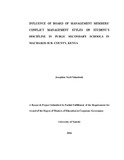| dc.description.abstract | The purpose of the study was to establish the influence of board of management members‘ conflict management styles on student‘s discipline in public secondary schools in Machakos sub- county, Machakos County-Kenya. The study was guided by five objectives which were; to determine the influence of competing, collaborating, avoidance, accommodation conflict management styles on students‘ disciple in Machakos sub-county. The study adopted descriptive survey research design. The study targeted all students and Board of Management members in public secondary schools in Machakos Sub-County. Purposive sampling was used to pick 67 schools, 67 student presidents and 67 BOM members (one from each school). Stratified sampling was first used to categorize the schools according to their levels, before sampling was done. The study adopted Thomas-Kilman conflict mode instrument (T.K.I) which provided detailed information on how effectively the five different conflict management styles could be applied. Questionnaires were used to collect data from both the students and board members. The questionnaires were administered by the researcher through a drop-wait-and-collect method. Data analysis was done by SPSS programme. Descriptive statistics such as frequencies, percentages, mean and standard deviation were used in the analysis. Data was presented using pie-charts, percentages, graphs and frequency tables. Through data analysis, the study established that the prevalence of indiscipline cases in schools was rated high at 95 percent. The study finding also revealed that avoidance, assertiveness and collaboration were commonly used by board members across all ages and gender. Compromising and accommodation styles were partially used. Furthermore, the study established that majority of the student took desirable actions to control conflicts between themselves and their colleagues. This meant that the cases of indiscipline in schools were largely due to conflicts between the school management and the students due to poor conflict resolution styles used. Essentially, more than half of the indiscipline cases in public secondary schools in Machakos sub-county were handled through suspension and expulsion, at the expense of timeout, conferences with adults, guidance and counseling and parent involvement. A comparison between the conflict management style used and frequency of indiscipline showed that, indiscipline in schools were mostly pronounced in schools where avoidance, assertiveness and collaboration conflict management styles were practiced. The study therefore concluded that cases of indiscipline in school were linked to the conflict management style used and recommended that school management should adopt styles that generate minimal conflicts when dealing with student indiscipline. The study suggested that further research on the challenges faced by school management boards in their quest to solve conflicts/indiscipline | en_US |



